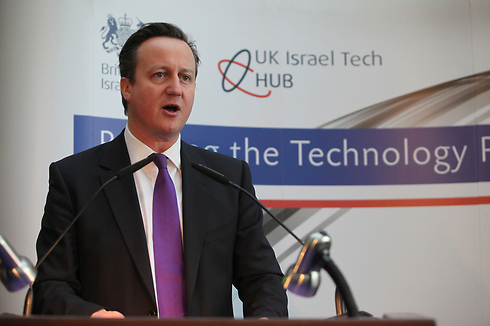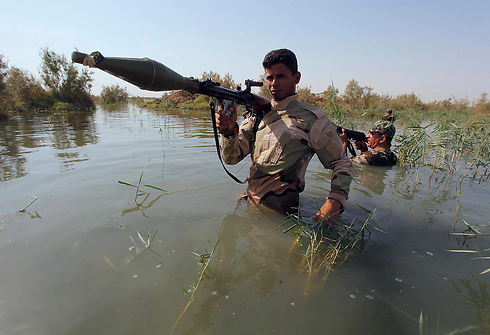
British Prime Minister David Cameron
צילום: AFP
PM Cameron promises tough action to fight Islamic State militants
Britain raises terror threat to severe; French teen questioned for connection to jihadists; US unaware of specific threats from ISIS.
Prime Minister David Cameron pledged Friday to plug gaps in Britain's armory to combat terror, describing the extremist threat posed by the Islamic State group as being more dangerous than even that of al-Qaeda.
Cameron's remarks came just moments after authorities raised Britain's terror threat level to severe, the second-highest level. The decision was related to developments in Iraq and Syria, but there was no information to suggest an attack was imminent.
"What we are facing in Iraq now with ISIL is a greater threat to our security than we have seen before," Cameron said, using an abbreviation for a longer name the Islamic State previously used: the Islamic State of Iraq and Levant.
He told reporters that while the Taliban facilitated al-Qaeda terrorism, the Islamic State group is "effectively a state run by terrorists." He said the ambition to create an Islamist caliphate isn't something that could be ignored.
Related stories:
- Some Gazans opt for ISIS over Hamas
- Qatar hits back at claims it backs Islamic State, Hamas
- Obama says does not yet have military strategy for Islamic State
"We could be facing a terrorist state on the shores of the Mediterranean and bordering a NATO member," he said, referring to Turkey.
Intelligence and security services now believe around 500 Britons have gone to fight in Syria and potentially Iraq. Some of the plots are likely to involve fighters who have traveled from Britain and Europe to take part in fighting in the Middle East.
British police have appealed to the public to help identify aspiring terrorists after the killing of an American journalist focused attention on extremism in the UK. The involvement of a person of British nationality in James Foley's beheading underscored the need to identify those who might travel abroad to fight or are at risk of being radicalized.
British authorities say around 70 arrests have been made in the first half of the year for a variety of offenses, including fundraising, preparing for terrorism acts and traveling abroad for terrorist training. The police say such arrests are being made at a rate five times greater than 2013.
One action Cameron outlined was the possibility that passports could be taken away. He said further measures would be described in the House of Commons on Monday.
Britain also wants to revive a directive to enable police and security services to share passenger records in the European Union. Concerns about civil liberties have stalled the measure in the European Parliament.
"The root cause of this threat to our security is quite clear," Cameron said. "It is a poisonous ideology of Islamist extremism that is condemned by all faiths and faith leaders."
Christian Leuprecht, a security expert at the Royal Military College of Canada and Queen's University, said that though officials said there was no specific threat made, it is likely that the UK raised the terrorist security alert due to data flowing to the Britain's intelligence agencies that caused them concern.
"It would suggest something more concrete than, 'Oh we'd better be careful,'" he said "Otherwise, you would see everyone in the West do this."
Jihadist teens in Paris
As if to highlight Cameron's point, a 14-year-old French girl was placed under investigation Friday for allegedly planning to carry out jihad, the third in a group of teenage girls caught before they left home.
The Paris prosecutor's office said the girl from Quimper, in Brittany, risks up to five years in a juvenile prison if the investigation leads to an indictment and conviction.
The girl, not named, was in contact with two other teens, aged 15 and 17, all allegedly planning together to travel abroad to join a jihadist group - even though they live in three different regions of France.
The prosecutor's office said the girls corresponded via social networks, but wouldn't give details.
French judicial officials are investigating 329 people who left France to carry out jihad, mainly in Syria, or wanted to.
No specific threats to US homeland
In the US however, the Department of Homeland Security said on Friday that it is not aware of any specific threat to the US homeland from Islamic State militants.
At the same time, Homeland Security Secretary Jeh Johnson released a statement in which he acknowledged that Islamic State militants "have demonstrated the intent and capability to target American citizens overseas." He noted that DHS took steps over the summer to strengthen security at overseas airports with direct flights to the United States.
Johnson said he has spoken to UK Home Secretary Theresa May about Britain's decision to raise its terrorism alert to the second-highest level.
US and European officials have said that because of relaxed border controls between European Union countries, it is difficult to track travel to Syria and Iraq by would-be foreign fighters. Often suspected militants are not identified until after they return to their home countries.
US authorities are particularly concerned about former foreign fighters in Syria and Iraq who have British or other European passports that would allow them to enter the United States with instant visas and minimal security vetting.
US and European officials have estimated that as many as 100 Americans have traveled to Syria or Iraq to fight with militants.
"This is a threat that the United States has been focused on. We've been coordinating closely with our allies, both the Brits, but others in Europe, about countering this threat and mitigating it," White House spokesman Josh Earnest said at a news briefing.
There was no plan to raise the US threat assessment level, he said.
While the United States once characterized threats under a system of color coded warnings, the Obama administration abandoned that system and now issues warnings targeted to particular transport or economic sectors.
Reuters contributed to this article.












